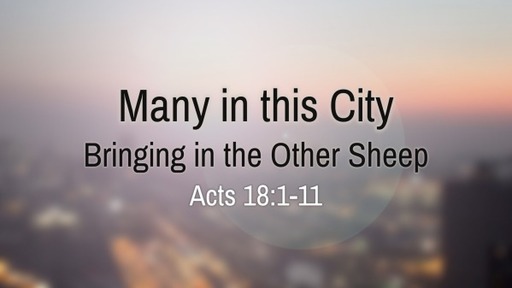Many in This City

God assured his apostle, “I have many people in this city.” Those were encouraging words. Paul’s work would not be fruitless. Some of the Corinthians were tired of Tinsel Town. The fleshly pleasures had lost their attraction. Some were suffering deep guilt and an awful emptiness of soul. They were ready to receive Christ. These people, according to Paul’s other writings, included Erastus, Gaius, Stephanos, Fortunatus, and Achaicus.
The Lord knows those that are his, yea, and those that shall be his; for it is by his work upon them that they become his, and known unto him are all his works. “I have them, though they yet know me not, though yet they are let captive by Satan at his will; for the Father has given them to me, to be a seed to serve me; I have them written in the book of life; I have their names down, and of all that were given me I will lose none; I have them, for I am sure to have them;” whom he did predestinate, those he called. In this city, though it be a very profane wicked city, full of impurity, and the more so for a temple of Venus there, to which there was a great resort, yet in this heap, that seems to be all chaff, there is wheat; in this ore, that seems to be all dross, there is gold. Let us not despair concerning any place, when even in Corinth Christ had much people.
O God, help us not to turn aside because of fear, but rather to have courage through the Holy Spirit. Help us to keep serving, fighting, hoping, proclaiming, no matter what obstacles the enemy might put in our way. Help us to recognize and claim the protection you have provided, knowing that whatever happens to us, no real harm can befall us, for we are shielded by your eternal love and faithfulness. Help us to remember that what we do for you will indeed bear fruit, for your glory and exaltation. In Jesus’ name, Amen.
